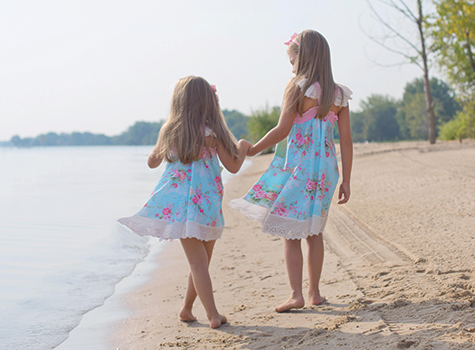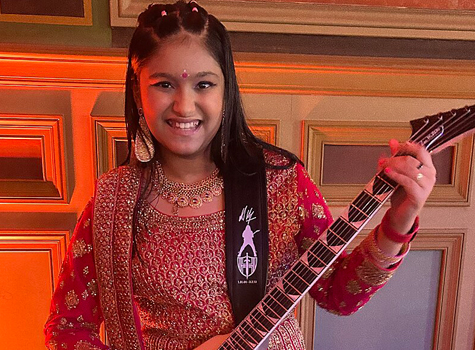By Shyama Parui

I approached Diwali with mixed feelings this year. The belief that we need to illuminate the darkness with light was intact but the grief that followed the loss of my sister was overwhelming. Bhai dooj enraged me in a way that even I struggled to comprehend. My naïve heart wondered if things would be different if we had celebrated both “bhai and behen dooj†(a brother and sister celebration). Would my prayers have granted my sister a long or at least a longer, healthier, and happier life?
As I mourned my beloved eldest sister, Bodo-di (big sister) as we affectionately called her, it gave me a chance to introspect on our sibling relationships in general. Regardless of birth order, siblings play a special role in our upbringing. Our brother may have been the first person we had a fist fight with, and our little sister was perhaps the first person we negotiated with. Nature documentaries often capture images of animal cubs sparring in the wild as the nonchalant mother continues to gather food. More than likely, “Mom knows best†and allows them to continue as the playful wrestling is teaching them skills needed for survival. The same principle applies to humans.
Every family is unique in the way sibling dynamics shape its members. For example, in my early childhood, Bodo-di was usually second in command, and became an excellent role model who showed us how to be organized and in charge. Her compassion, generosity and selfless caring for others were evident even when she was ill and spoke with great effort. It’s hard to quantify how much I have learned from her, but every bit is priceless. An ugly realization of life not being fair also dawned on me, that even the kindest people are vanquished by cancer, dubbed as the “Emperor of Maladies†but a tyrant in my eyes. The day after I had heard the news, I continued going about my day to mellow my emotions, but the hours filled me with a void. Mourning away from one’s relatives was much harder than I thought. Being absent from the rituals bereavement and missing the chance to share stories with my nephews about their mother was heartbreaking.
For my parents, their siblings were also their closest friends. Coming from large families, they often cared for the younger brothers and sisters who evolved into playmates, study partners and when the time was right, their proteges. Traditionally, children higher in the birth order are not only teachers to the little ones but the responsibilities assigned to them often builds multiple skills that serves them well in their careers. One cannot expect all brothers to have a relationship like Ram and Lakshman.
Even the goddesses Lakshmi and Saraswati are depicted in ancient tales as sisters harboring rivalry and having frequent arguments. Joint families around the world must find a way to navigate through sibling issues during adulthood as serious conflicts can escalate ultimately, leading to estrangement.
In the United States where joint families are not common, it has been found that only about half the population contacts their siblings at least once a month. With the rest, the strength of the attachment seems to go downhill as people grow up.
However, it is noteworthy that “the number of Americans who are completely estranged from a sibling is relatively small—less than five percent, according to Karl Pillemer at Cornell University†(psychologytoday.com). Cutting off ties with your brothers or sisters could be a consequence of bullying, abuse or simply due to losing common interests and eventually drifting apart for good. Like all relationships, the output will be in proportion to the effort put in. This is where family and/or religious traditions can help.
Thanksgiving and Christmas holidays bring families together and carving out time or specific activities for siblings to share can make it memorable. Raksha Bandhan and Bhai Dooj with its time-tested rituals present brothers and sisters an opportunity to refresh the commitment they have toward one another every year. Although, I don’t think that these two festivals should be limited to the bandhan (bond) between opposite sex siblings. Sisters are known to protect each other, and brothers care for the wellbeing of their brothers, too. Expecting family vacations or celebrations to resolve tensions is being foolhardy. In my mind, rituals are catalysts that strengthen family ties when true love exists.
In the absence of genuine affection, those actions are meaningless.
Healthy relationships among siblings take on greater importance when they are running a family business or making decisions about their parents or property. Traditionally, outside help is seen as unwelcome but there is value in inviting moderators or family therapists to steer the members toward resolution of the most critical issues.
Despite our tendency to hate the things our siblings do, there is greater benefit to loving one another, especially if you prefer profits over losses. So, it may be worthwhile to increase your investment in that timeless bond.
Whether you are an only child or you have grown up with siblings, l hope that the holidays bring you much joy and happy moments with your loved ones.
Shyama Parui is a long time North Carolina resident and an ardent writer. You can reach her at: [email protected]



